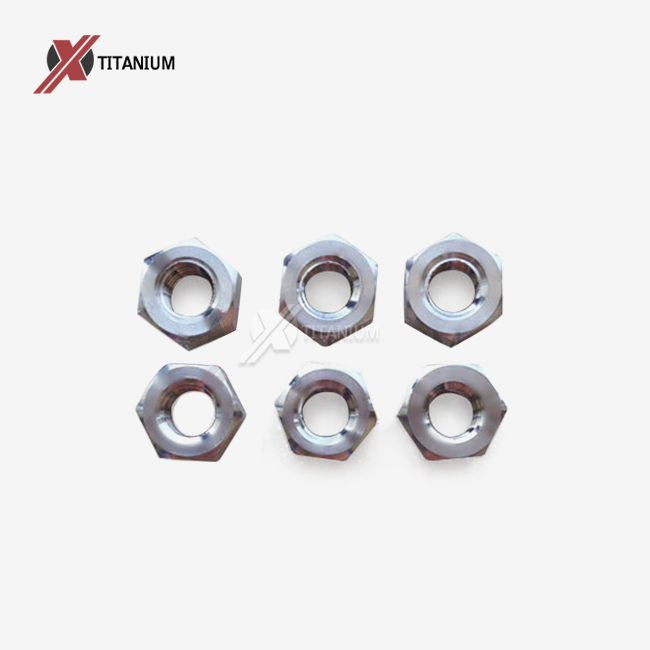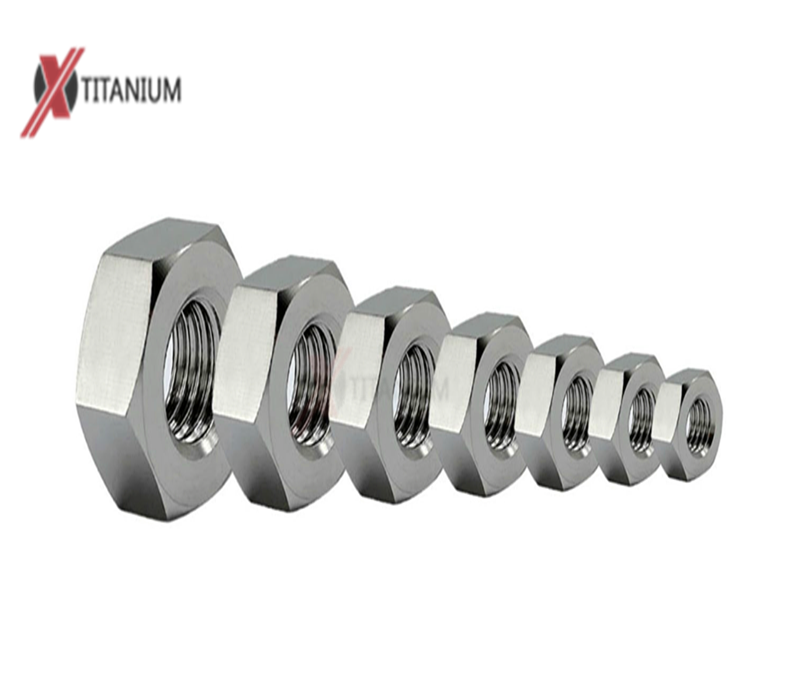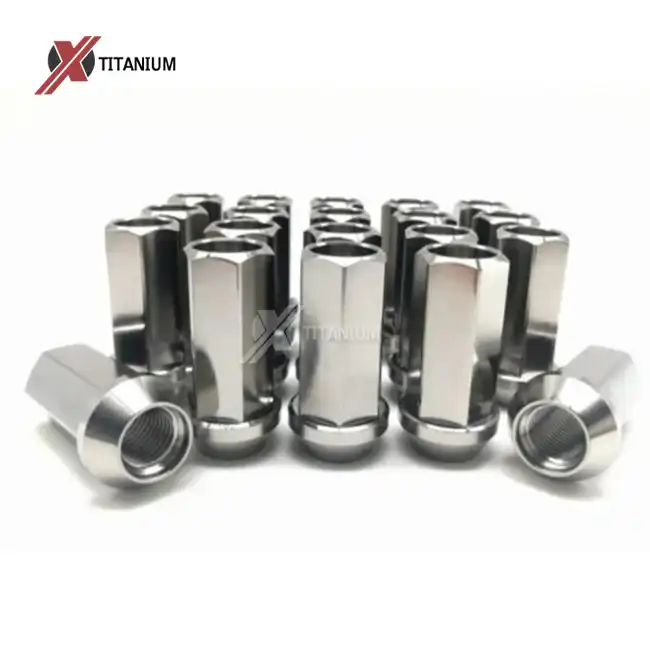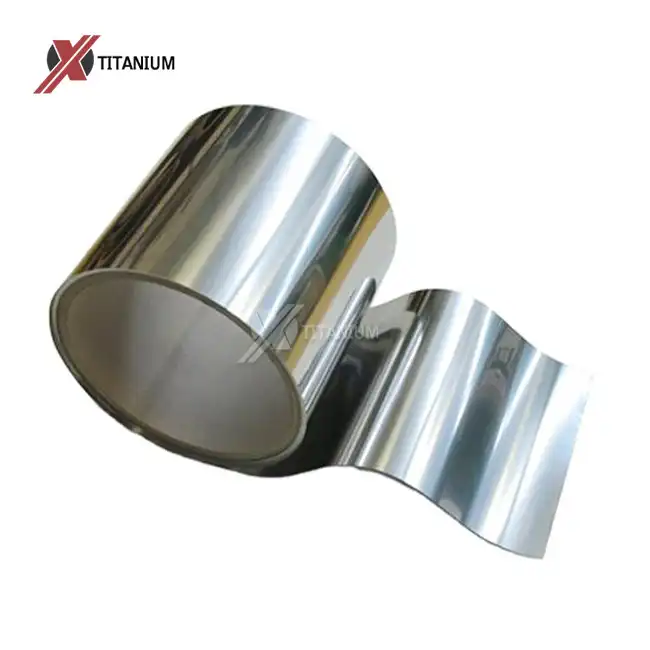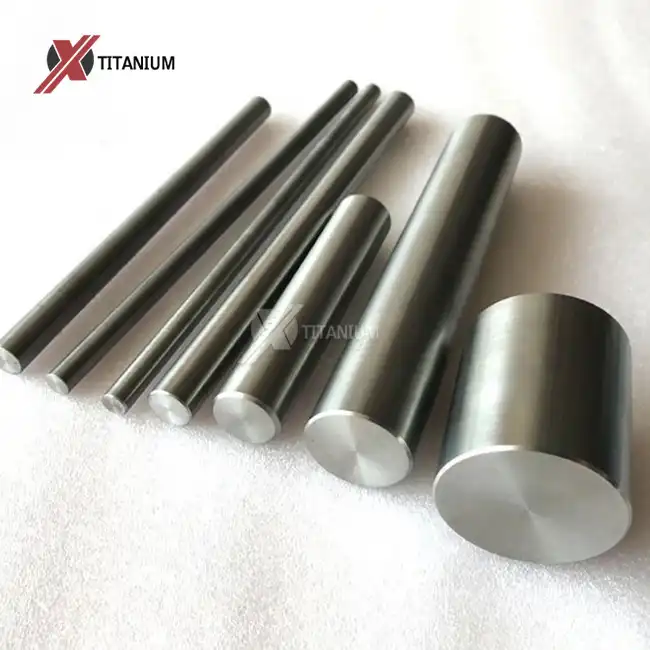Understanding Titanium Hex Nuts and Their Properties
Composition and Grades of Titanium Used in Hex Nuts
Titanium hex nuts are crafted from various grades of titanium alloys, each offering specific advantages. The most common grade used is Grade 5 (Ti-6Al-4V), which combines titanium with 6% aluminum and 4% vanadium. This alloy provides an excellent balance of strength, weight, and corrosion resistance. Other grades, such as Grade 2 (commercially pure titanium) and Grade 7 (titanium with a small amount of palladium), are also utilized depending on the application requirements.
The unique properties of titanium contribute significantly to the performance of hex nuts in challenging environments. Titanium's low density (approximately 60% that of steel) results in lightweight fasteners that don't compromise on strength. Moreover, the high strength-to-weight ratio of titanium alloys ensures that these hex nuts can withstand substantial loads while minimizing the overall weight of the assembly.
Manufacturing Processes for Titanium Hex Nuts
The production of titanium hex nuts involves sophisticated manufacturing techniques to ensure precision and quality. Computer Numerical Control (CNC) machining is often employed to create hex nuts with tight tolerances and excellent surface finishes. This process allows for the production of custom sizes and thread configurations, catering to specific industry needs.
Surface treatments play a crucial role in enhancing the performance of titanium hex nuts. Anodizing, for instance, can increase the thickness of the natural oxide layer, further improving corrosion resistance and providing aesthetic options such as colors ranging from gold to blue, green, purple, and even black. Nitriding is another treatment that can be applied to titanium hex nuts, enhancing surface hardness and wear resistance without compromising the material's corrosion-resistant properties.
Titanium Hex Nuts in Acidic Environments: A Closer Look
Chemical Reactions and Passivation
When titanium hex nuts are exposed to acidic environments, a fascinating chemical process occurs. The surface of the titanium reacts with oxygen in the air or the surrounding medium to form a thin, stable oxide layer. This layer, primarily composed of titanium dioxide (TiO2), acts as a protective barrier against further corrosion. This phenomenon, known as passivation, is crucial for the longevity of titanium fasteners in aggressive chemical environments.
The passivation layer on titanium hex nuts is remarkably tenacious and self-healing. If the surface is scratched or damaged, exposing fresh titanium, the metal quickly reacts with oxygen to reform the protective oxide layer. This continuous process ensures that the hex nuts maintain their corrosion resistance even under prolonged exposure to acids.
Performance in Various Acidic Media
Titanium hex nuts demonstrate exceptional resistance to a wide range of acids. In sulfuric acid solutions, which are notorious for their corrosivity, titanium fasteners show minimal degradation even at high concentrations and elevated temperatures. Hydrochloric acid, another common and aggressive acid, has little effect on titanium hex nuts, making them suitable for use in chemical processing equipment and offshore applications where exposure to seawater (which contains chlorides) is frequent.
Nitric acid, often used in the production of fertilizers and explosives, poses no significant threat to titanium hex nuts. Even in highly oxidizing environments created by nitric acid, the fasteners maintain their structural integrity. This resilience extends to organic acids as well, such as acetic acid and citric acid, commonly found in food processing and pharmaceutical industries.
Temperature Effects on Acid Resistance
The performance of titanium hex nuts in acidic environments is also influenced by temperature. Generally, titanium's corrosion resistance improves as temperature decreases, making it an excellent choice for cryogenic applications. However, even at elevated temperatures, titanium hex nuts maintain impressive resistance to many acids.
It's worth noting that while titanium hex nuts excel in most acidic conditions, they may show susceptibility to certain specific environments. For instance, hot concentrated sulfuric acid or hydrofluoric acid can attack titanium. In such extreme cases, specialized alloys or alternative materials may be necessary. However, for the vast majority of industrial applications involving acidic media, titanium hex nuts provide superior performance and longevity.
Advantages and Applications of Titanium Hex Nuts in Corrosive Environments
Comparative Advantages Over Other Materials
When compared to fasteners made from other materials, titanium hex nuts offer several distinct advantages in corrosive environments. Unlike stainless steel, which can suffer from pitting and crevice corrosion in chloride-rich acidic media, titanium remains largely unaffected. Aluminum fasteners, while lightweight, lack the corrosion resistance of titanium and can rapidly deteriorate in acidic conditions.
The superior strength-to-weight ratio of titanium hex nuts allows for weight reduction in assemblies without compromising structural integrity. This is particularly beneficial in aerospace and automotive applications where every gram matters. Furthermore, the biocompatibility of titanium makes these fasteners ideal for medical implants and equipment that may come into contact with bodily fluids, which can be mildly acidic.
Specific Industrial Applications
The chemical processing industry heavily relies on titanium hex nuts for their exceptional acid resistance. In reactors, heat exchangers, and piping systems handling corrosive chemicals, these fasteners ensure long-term reliability and minimal maintenance requirements. The oil and gas sector, particularly in offshore installations, benefits from titanium hex nuts' ability to withstand the combined effects of saltwater and acidic compounds often present in crude oil.
In the aerospace industry, titanium hex nuts find applications in engine components and structural elements exposed to various fluids and environmental conditions. Their light weight contributes to fuel efficiency, while their corrosion resistance ensures safety and longevity. The marine industry also leverages titanium fasteners for underwater equipment, propulsion systems, and desalination plants where exposure to seawater is constant.
Long-term Cost Benefits
While the initial cost of titanium hex nuts may be higher than that of fasteners made from more common materials, the long-term economic benefits are substantial. The extended lifespan of titanium fasteners in acidic environments translates to reduced maintenance frequency and lower replacement costs. This is particularly significant in applications where downtime for maintenance or replacement is costly, such as in continuous process industries or offshore platforms.
Moreover, the use of titanium hex nuts can lead to overall design optimizations. Their high strength allows for the use of smaller fasteners in some cases, potentially reducing material costs and simplifying assembly processes. The corrosion resistance of titanium also eliminates the need for additional protective coatings or frequent inspections, further reducing lifecycle costs.
Conclusion
Titanium hex nuts demonstrate remarkable performance in acidic environments, offering unparalleled corrosion resistance, strength, and durability. Their ability to form a protective oxide layer, coupled with their inherent chemical stability, makes them indispensable in industries dealing with corrosive media. From chemical processing to aerospace applications, titanium hex nuts provide long-lasting, reliable solutions for fastening needs in challenging conditions.
As industries continue to push the boundaries of material performance, titanium hex nuts stand out as a testament to advanced engineering and material science. Their unique combination of properties not only solves current challenges in corrosive environments but also opens up possibilities for innovative designs and applications.
For more information about titanium hex nuts and other titanium products, please contact Baoji Chuanglian New Metal Material Co., Ltd. at info@cltifastener.com or djy6580@aliyun.com. Our team of experts is ready to assist you in finding the perfect titanium solution for your specific needs.
